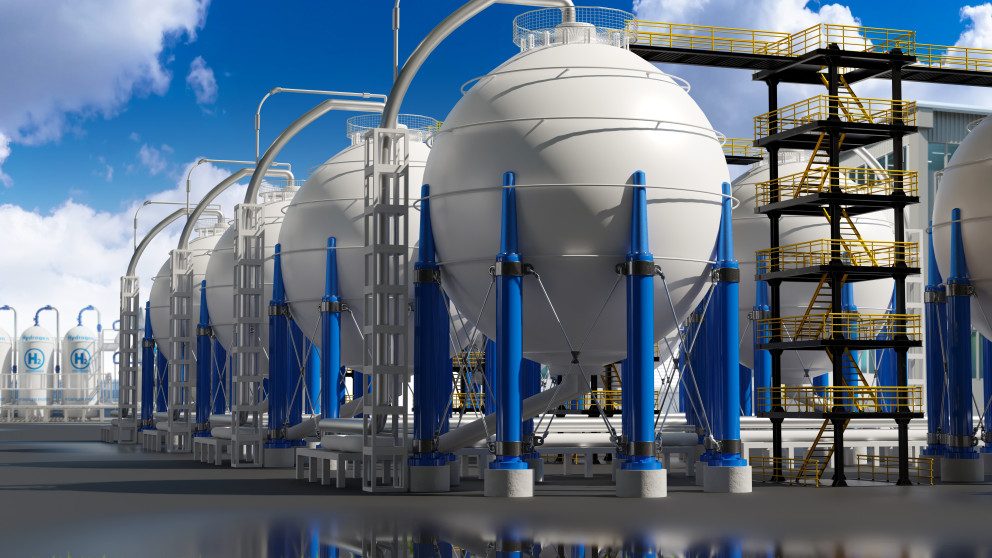Study Outlines Key Role of National and EU Policy to Control Emissions from German Hydrogen Economy
14.11.2024
Hydrogen is set to play an important role in a future low-carbon economy. However, the hydrogen value chain comes with a set of emissions challenges that need to be addressed for hydrogen deployment to help achieve climate goals. A study prepared by the Research Institute for Sustainability – Helmholtz Centre Potsdam (RIFS) with support from Environmental Defense Fund Europe evaluates the potential impact of climate-warming emissions in Germany’s future hydrogen economy and provides recommendations for German and EU policymakers on how to avoid them.

There are hopes that hydrogen can become a carbon neutral alternative to fossil fuels, given that hydrogen combustion does not produce carbon dioxide (CO2). It is often seen as the only viable solution for the decarbonisation of industrial sectors such as steel and chemical production. As a result, hydrogen has become an integral part of Germany's national climate strategy to reach net zero by 2045, as Europe’s top emitter [1].
To date, the political debate in Germany has focused on enabling a rapid ramp-up of renewable – or ‘green’ – hydrogen production and building up the necessary infrastructure, both in Germany and in Europe. Yet little attention has been paid to the fact that, regardless of the production method, there are emission challenges with deploying hydrogen that need to be addressed if it is to deliver climate benefits. In the study Controlling Emissions in Germany's Future Hydrogen Economy, the authors evaluate these emissions - which include methane, carbon dioxide, and hydrogen emissions themselves - and identify policy levers at the national, European, and international level to minimize the impacts.
“As the EU shifts gears after five years of Green Deal policies towards the next big policy juncture – the EU Clean Industrial Deal – it’s crucial that while it looks to build out a competitive hydrogen industry, it remains focused on reducing harmful climate-warming emissions,” says Léa Pilsner, Senior Policy Manager at Environmental Defense Fund Europe.
The warming impact of hydrogen as an indirect greenhouse gas (GHG)
The findings of this research show that the hydrogen emissions from a hydrogen value chain based entirely on green hydrogen would amount to around eleven million tonnes of CO2-equivalents (GWP100) in 2045. To put this into perspective, this is equivalent to approximately 17% of Germany’s projected residual GHG emissions in 2045 in its net zero scenarios.
Although hydrogen itself is not a direct greenhouse gas, its chemical reactions in the atmosphere lead to an increase in the abundance of other GHGs, namely methane, tropospheric ozone and stratospheric water vapour. Taking these reactions into account, the global warming potential of hydrogen over a hundred years is more than eleven times higher than that of CO2.
Study shows scenarios for a future German hydrogen economy
"We need to ensure that the development of hydrogen is done with environmental integrity, and that means minimizing emissions - including of hydrogen itself”, says study author Kathleen Mar. She explains: “Control measures are needed to make sure hydrogen's promise as a low-carbon fuel can be realized."
Taking Germany’s National Hydrogen Strategy as a starting point, the authors develop several illustrative scenarios for a future German hydrogen economy based on domestically produced green hydrogen and imported green and blue hydrogen. In a next step, the authors quantify the expected hydrogen (H2) emissions along with methane (CH4) and carbon dioxide (CO2) emissions (for the case of blue hydrogen) of these scenarios and their global warming potential. The study also examines potential entry points for policy measures aimed at reducing or avoiding these emissions and provides an overview of the current German and EU regulatory landscape relevant for the hydrogen sector. It concludes by offering recommendations on how to account for and control these emissions along the hydrogen value chain.
Key findings from the study:
- Hydrogen emissions contribute to climate change and policy measures are needed to reduce or avoid these emissions.
- We estimate that hydrogen emissions occur primarily at the point of production, where they can be controlled.
- The European Union should acknowledge the role of hydrogen as an indirect greenhouse gas and include hydrogen emissions in the methodologies for calculating emissions savings from hydrogen.
- The EU should strengthen the regulatory framework to curb all climate-warmings emissions from the production of blue hydrogen in the EU and abroad.
- Extending the EU Methane Regulation to include methane emissions from imported hydrogen and its derivatives is an important first step towards a more robust regulatory framework.
“Using Germany, Europe’s biggest industrial base and potential hydrogen market, as an example, our study highlights the importance of not underestimating the impacts of three key direct and indirect greenhouse gases (GHGs) related to hydrogen deployment – methane, carbon dioxide, and hydrogen itself”, says study author Rainer Quitzow from the RIFS. “The evidence presented is a call to action for smart policy choices that balance climate and economic imperatives.”
Join our Report Launch and Discussion:
Controlling Emissions in a European hydrogen economy Tuesday, December 3rd, 2024, 10:00-11:00 (CET) via Zoom
Register here:
You will receive the link to join the event with the confirmation e-mail after registration.
Publications:
Kathleen A. Mar, Rainer Quitzow, Finn Haberkost, Mona C. Horn, Hannah Lentschig, Charlotte Unger, Andreas Goldthau: Controlling Emissions in Germany’s Future Hydrogen Economy. Entry-Points for Policy Action, RIFS Study 10/2024. DOI: 10.48481/rifs.2024.016
Kathleen A. Mar & Rainer Quitzow: Controlling emissions in a European hydrogen economy Greenhouse gas (GHG) emissions from a future hydrogen economy could be substantial if not adequately managed. RIFS Policy Brief 02/2024. DOI: 10.48481/rifs.2023.030
----------------------------------------------------------------------
[1] European Parliament: Climate Change in Europe - Facts & Figures


